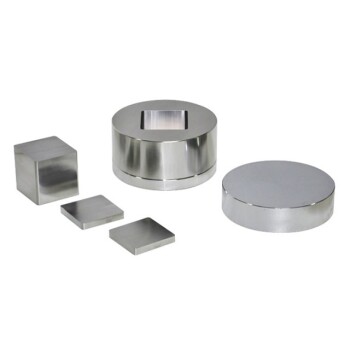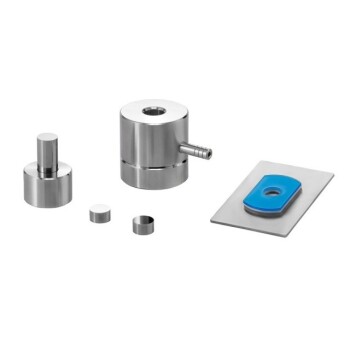At its core, a laboratory press transforms raw polymer material into a standardized, uniform sample. By applying precisely controlled heat and pressure, it creates specimens—such as films, plaques, or pellets—that are suitable for a wide range of analytical and mechanical tests, ensuring that the results are reliable and repeatable.
The fundamental role of a laboratory press is not merely to shape plastic, but to eliminate variables in sample preparation. This control is the critical first step in generating trustworthy data, ensuring that you are testing the material's intrinsic properties, not the inconsistencies of a poorly made sample.

The Foundation of Reliable Testing: Sample Preparation
The most common source of error in materials testing does not come from the analytical instrument itself, but from inconsistent sample preparation. A laboratory press is designed to solve this exact problem.
From Raw Material to Testable Specimen
Polymers often start as powders, pellets, or granules (like PE, PP, or ABS). These forms are impossible to test directly for properties like tensile strength or impact resistance.
A press consolidates this raw material into a solid, homogenous shape with uniform density. This process ensures the final specimen is free of voids and internal stresses that would compromise test results.
The Principle of Controlled Force and Temperature
The power of a press lies in its ability to apply specific, repeatable conditions. Controlled pressure ensures uniform compaction and density throughout the sample.
For thermoplastic polymers, controlled heat is equally critical. Heated platens melt the material, allowing it to flow and fuse into a cohesive whole, while a controlled cooling cycle can influence the material's final crystallinity and morphology.
Meeting International Standards
Nearly all standardized polymer tests, such as those from ASTM or ISO, specify the exact dimensions and characteristics of the test specimen.
Using a laboratory press is often the only way to produce samples that consistently meet these stringent requirements, making your results comparable to data from labs around the world.
Key Applications in Polymer Analysis
Once a proper sample is created, it becomes the input for numerous analytical methods. The press is the gatekeeper that enables this subsequent analysis.
Mechanical Property Testing
Tests for tensile strength, flexural modulus, and impact resistance are highly sensitive to sample geometry and internal flaws. A press produces the consistent "dog bone" or rectangular bar specimens required for this, ensuring that failure occurs due to the material's properties, not a sample defect.
Spectroscopic and Compositional Analysis
Techniques like X-Ray Fluorescence (XRF) and Infrared (IR) Spectroscopy depend on the sample's surface and thickness.
A press can create the smooth, flat surface needed for XRF or produce the extremely thin films required for transmission IR spectroscopy, allowing for accurate compositional and structural analysis.
Advanced Material Development
Beyond routine quality control, presses are vital tools in research and development. They are used to create novel composite materials, embedding fibers or fillers into a polymer matrix under heat and pressure.
They can also be used for high-pressure polymerization, accelerating chemical reactions to create new polymers with tailored molecular weights and enhanced properties.
Understanding the Trade-offs and Limitations
While essential, a laboratory press is a tool that requires proper understanding and operation to be effective.
The Impact of Process Parameters
The final properties of a pressed sample are directly influenced by the pressure, temperature, and time used. A slight deviation in the heating or cooling rate can change the polymer's crystallinity, which in turn alters its mechanical properties. This highlights the need for precise process control.
Platen Temperature Uniformity
A common pitfall is non-uniform temperature across the press platens. If one area is hotter than another, the resulting sample will have inconsistent density and internal stresses, rendering it useless for reliable testing.
Manual vs. Automated Presses
Manual presses offer lower cost and simplicity, making them suitable for educational settings or low-volume R&D. However, they are subject to operator variability.
Automated presses provide unparalleled repeatability by controlling pressure, temperature, and cycle times precisely, making them essential for high-throughput quality control and accredited testing labs.
Making the Right Choice for Your Goal
The way you use a laboratory press should align directly with your ultimate objective.
- If your primary focus is routine quality control: You need a press that guarantees repeatability to produce samples that consistently meet ASTM/ISO standards.
- If your primary focus is research and development: You need a versatile press with precise control over a wide range of pressures and temperatures to explore new material formulations and composites.
- If your primary focus is high-throughput analysis: You need an automated press to maximize efficiency, reduce operator-to-operator variability, and streamline your workflow.
Ultimately, the laboratory press is the indispensable bridge between raw polymer and meaningful, actionable data.
Summary Table:
| Aspect | Role in Polymer Testing |
|---|---|
| Sample Preparation | Transforms raw polymers into standardized specimens for reliable testing. |
| Controlled Conditions | Applies precise heat and pressure to ensure uniform density and properties. |
| Applications | Enables mechanical tests (e.g., tensile strength), spectroscopy, and material R&D. |
| Standards Compliance | Produces samples that meet ASTM/ISO requirements for global comparability. |
Ready to enhance your polymer testing accuracy? KINTEK specializes in high-quality lab press machines, including automatic, isostatic, and heated presses, designed to deliver precise sample preparation for laboratories. By partnering with us, you'll achieve consistent, reliable results that meet international standards, reduce errors, and accelerate your R&D or quality control processes. Contact us today to discuss how our solutions can fit your specific needs and drive your success!
Visual Guide

Related Products
- Laboratory Hydraulic Press 2T Lab Pellet Press for KBR FTIR
- Manual Heated Hydraulic Lab Press with Integrated Hot Plates Hydraulic Press Machine
- Automatic Laboratory Hydraulic Press Lab Pellet Press Machine
- Laboratory Hydraulic Press Lab Pellet Press Button Battery Press
- Manual Laboratory Hydraulic Press Lab Pellet Press
People Also Ask
- What are some laboratory applications of hydraulic presses? Boost Precision in Sample Prep and Testing
- What is the role of a hydraulic press in KBr pellet preparation for FTIR? Achieve High-Resolution Chemical Insights
- How is a laboratory hydraulic press used for Tb(III)-Organic Framework FT-IR samples? Expert Pellet Pressing Guide
- Why is sample uniformity critical when using a laboratory hydraulic press for humic acid KBr pellets? Achieve FTIR Accuracy
- How do hydraulic press machines ensure precision and consistency in pressure application? Achieve Reliable Force Control for Your Lab



















